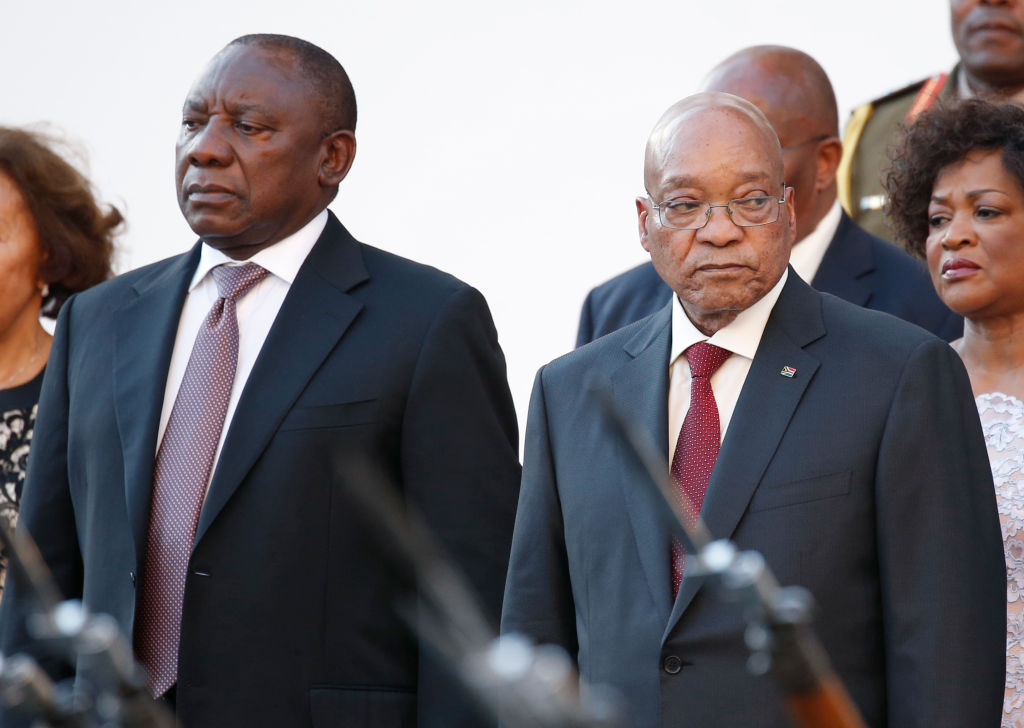
A tumultuous two weeks in South Africa have propelled corruption into international headlines after the country’s Constitutional Court jailed former president Jacob Zuma for contempt of court.
On 7 July, Zuma, a man known for his brazen disregard for laws and retribution, handed himself in at the eleventh hour to begin serving his 15-month sentence. Then followed days and nights of rioting and looting in which more than 200 people were killed. President Cyril Ramaphosa’s government sent in thousands of troops to restore order.
Zuma’s jailing signals a victory for Ramaphosa in the fight for the soul of the ruling African National Congress. The former president’s undoing was his relentless refusal to face accountability when he defied an order from South Africa’s apex court to appear before the judicial inquiry into public sector corruption and fraud, chaired by Deputy Chief Justice Raymond Zondo.
The commission is tasked with uncovering the extent to which corruption has infected South Africa’s governance systems. It will report its findings and recommendations to Ramaphosa. Since its establishment in 2018, the commission has heard testimony from members of parliament, intelligence officials and top business executives in relation to a range of corruption scandals.
Although the Zondo commission was recommended in a report by a former public prosecutor and is backed by the Constitutional Court and led by a judge, its recommendations aren’t binding. And if the commission finds Zuma liable to be indicted for mass corruption, it has no power to convict him.
At its roots, the court’s decision to sentence Zuma was about maintaining the legitimacy of South Africa’s legal system by asserting that no one—not even a former president—is above the law. Numerous commentators have viewed this historic moment as an exemplar of the rule of law holding politicians to account on a continent that often fails to do so.
Despite being endemic for 350 years, corruption in a post-apartheid South Africa is especially corrosive for the young democracy trying to realise its dream of a free and fair society. Regularly dominating news headlines and public debate, corruption has become ingrained in South African life with frequent reports of new fraud cases and arrests.
Zuma’s presidency was tainted by constant allegations of corruption as he sat front and centre in a vast web of racketeers and fraudsters. Under his leadership, the ANC struggled to maintain its celebrated image as the country’s liberator and became synonymous with mismanagement, bribery and crookedness.
The fiscal ramifications of corruption during Zuma’s tenure were astronomical. During his second term, the misuse of public funds cost the country around 1.5 trillion rand, or a third of its GDP, including losses to the budget, tax revenue, debt services and more.
Some argue that the corruption woes are not entirely Zuma’s fault and that his removal did little to quell theft in government. The Covid-19 pandemic has exposed the inability of South Africa’s governance systems to prevent mass exploitation of public funds, especially during times of desperate need. Last year, Ramaphosa introduced the country’s largest stimulus package, costing 500 million rand, coinciding with compulsory pandemic lockdowns. However, what should have been historic economic relief was dogged by fraud allegations. Subsequent investigations revealed practices ranging from trumped-up costs for personal protective equipment to companies claiming payments from unknowing employees and some who had passed away. It’s evident that many of South Africa’s institutions are rife with corruption.
But Zuma’s brand of corruption generated special discontent in the country and fractures within the ANC. Under his leadership, corruption became sophisticated and organised. The lines between public and private entities became blurred and the state was used as an apparatus to fund his private interests. He used public funds to bankroll his residential estates and is alleged to have enabled tycoon brothers from the Gupta family to influence ministerial appointments. Those allegations have been strongly denied.
Before Zuma became president, 783 corruption charges were prepared against him. Now he may be liable to face them. His misuse of public funds significantly threatened the ANC’s hegemony with dwindling electoral support and led to the establishment of the Zondo commission to lay bare the extent of his corruption for all to see.
So far, the commission has uncovered mass corruption allegations, with 40 witnesses accusing Zuma of extorting billions from state coffers and devaluing state enterprises. Since Zuma’s ousting, one of Ramaphosa’s main objectives has been to root out government corruption.
At every opportunity, Zuma has attempted to undermine Ramaphosa’s leadership of the ANC. The party is fragile and deeply divided and it’s now standing at a crossroads. Ramaphosa’s faction is committed to reforming public institutions, viewing corruption as a blockade to economic growth and investment. Conversely, Zuma’s wing believes that Ramaphosa’s crusade against corruption is ill-fit for purpose and that he should focus on redistributing wealth from South Africa’s white minority to the black majority.
Despite the Zondo commission’s limited jurisdiction, Zuma should still be concerned. The commission is an avenue for collective sensemaking and has many merits, including depoliticising major issues, fostering mutual understanding in the public and cultivating agreement for widespread institutional change. The last of these may concern Zuma most.
Zuma’s arrest presents Ramaphosa with a much-needed opportunity to wield a tighter grip on his fragile party, and the Zondo commission could be the tool by which he gains control. It’s likely that some of Zuma’s supporters within the ANC have already shifted their loyalty to Ramaphosa, as many did when Zuma was ousted as head of state.
Ramaphosa has previously demonstrated his support for the commission, admitting that the ANC ‘could and should have done more to prevent the abuse of power and the misappropriation of resources that defined the era of state capture’.
The Zondo commission could have profound consequences for those engaging in, sustaining and profiting from corruption in South Africa. But that will only be the case if Ramaphosa uses his political capital to implement its recommendations.

